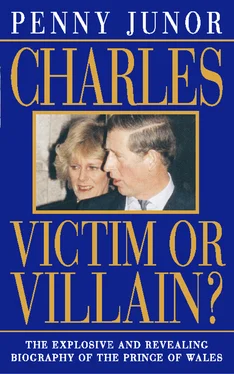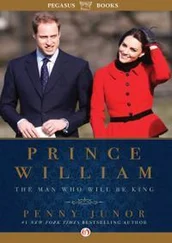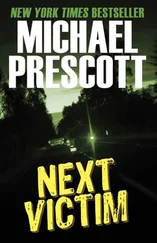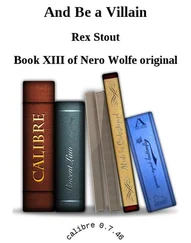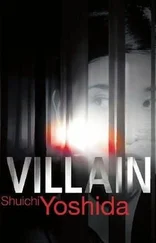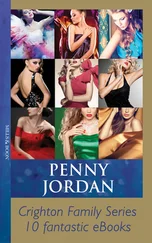The Prince of Wales thought he had found the girl of his dreams, the girl whom the country would find acceptable, and who would be able to share his job and his life. He had not reached this judgement alone. He was not a normal man wanting a normal wife to live a normal life. He had waited a long time to find the right person, and he was now thirty-two years old. It was important for the country that he make the right decision, and he wanted to be reassured by his friends and advisers that he was correct in his selection. But though he canvassed opinion about Diana before he asked her to marry him, and he relied upon friends to bolster his resolve, once she had accepted his proposal, the subject was closed. He had made his decision, and was not receptive to advice, warning or criticism. He was determined that the decision to marry Diana was the right one, and when doubts began to creep into his mind during the five months before the wedding, he kept them to himself.
‘I do believe I am very lucky that someone as special as Diana seems to love me so much,’ he wrote to two of his friends. ‘I am already discovering how nice it is to have someone round to share things with … Other people’s happiness and enthusiasm at the whole thing is also a most “encouraging” element and it makes me so proud that so many people have such admiration and affection for Diana.’
The truth was rather different; but when his friends told him they had serious doubts about the suitability of the match, he refused to listen. When he himself began to have serious doubts about Diana, he refused to talk about it. He went ahead knowing that there was a question mark over the future. To have called off the wedding would have been horrendous and humiliating for everyone, and the headlines and public castigation could only be imagined, but with hindsight, it would have been infinitely less painful and less damaging to everyone concerned, particularly the monarchy, if he had had the courage to do it.
There are some close to the Prince who believe he had a duty at least to have discussed it. A relative goes so far as to say that his failure to do so was his big mistake.
‘In his position he bloody well should have spoken to people because he had to think of the constitutional side as well as the private side. He had chosen Diana with both sides in mind, but equally he needed to think of the consequences for both, if it was going to go wrong.’
FIVE
‘Such exciting news …’
Camilla
The Prince of Wales proposed in early February, just after his annual skiing holiday with the Palmer-Tomkinsons in the Swiss resort of Klosters. He had phoned Diana from Switzerland and told her he had something to ask her when he got back the next day. Knowing full well what the question was likely to be, she laughed when he said, ‘Will you marry me?’ But was not slow to reply, ‘Yeah, okay.’
Then she laughed some more. He was thrilled.
‘You do realise that one day you will be Queen,’ he said.
‘Yes,’ she said. ‘I love you so much, I love you so much.’
According to Diana, he then coined that most memorable phrase, ‘Whatever love is’, and ran upstairs to telephone his mother with the news.
Diana rushed back home to tell her flatmates, and they screamed and howled and went for a drive around London with their secret. Meanwhile, the Prince rang a few of his closest confidants to let them know how he had got on, one of whom was Camilla Parker Bowles. Not because she was his lover – that had ended when he started to fall for Diana’s charms – but because she was his best friend, as she is today. She had played a key role in helping and advising Charles in his relationship with Diana. She and Andrew had been at Balmoral in September, and he had taken Diana to spend weekends at their house in Wiltshire several times. They had been racing at Ludlow together from there, when Charles was riding his racehorse, Allibar; he had first taken Diana to see Highgrove while staying with the Parker Bowles; and he and Andrew had been hunting together on a couple of occasions, leaving Diana and Camilla together at home. Camilla had known he was planning to propose to Diana that day and, like so many others, was eager to have a progress report.
The Prince had also told Michael Colborne, secretary to the Prince of Wales’s office, about his marriage plans the day after the proposal. He had come into Colborne’s office in Buckingham Palace, sat down in an armchair and told Michael to shut the door.
‘I’ve got something to tell you,’ he said. ‘Other than Her Majesty, and Papa and a few others, nobody knows. This is between you and me. I’ve asked Lady Diana to marry me, and she said yes straight away, but I’ve asked her to think about it and she’s going to Australia to stay with the Shand Kydds. We’ve got a very busy period in front of us and we’ve got a tour coming up …’
Michael was thunderstruck. ‘Congratulations, sir,’ he said.
The Prince smiled. ‘Well, we’ll see what happens.’
Michael Colborne knew the Prince better than most, and was to play an important part in Diana’s early years at court. The two men had met aboard HMS Norfolk when the Prince was a sub-lieutenant and Colborne a non-commissioned officer, and he was one of the few people who were not afraid to tell the Prince what he thought. They struck up a good friendship and, when the Prince left the Navy and needed to set up an office in London, he invited Colborne to join it. Officially in charge of his financial affairs, he became the Prince’s right-hand man, and remained with him for ten years, providing many valuable lessons about what life was like beyond the ocean of privilege in which the Prince swam. He was the only member of his staff at the time who was not in the public school, officer training college or Foreign Office mould, and he viewed all those who were with a healthy disdain. The Prince liked his straightforward approach. In offering Colborne the job he had made him promise that he would never change. ‘If you don’t agree with something, you say so,’ he had said, and over the years Michael had spoken his mind. Charles didn’t always like what he heard and became extremely angry on several memorable occasions, but it was an exceptionally warm relationship nonetheless.
That same day, Diana went to Australia for a holiday with her mother and stepfather, Peter Shand Kydd. As Charles put it, ‘to think if it was all going to be too awful’. For three weeks they hid from the press and kept Diana’s whereabouts such a guarded secret that even the Prince of Wales had difficulty getting through to her when he telephoned.
‘I rang up on one occasion,’ he said in a television interview after the engagement had been announced, ‘and I said, “Can I speak?” And they said, “No, we’re not taking any calls.” So I said, “It’s the Prince of Wales speaking.” “How do I know it’s the Prince of Wales?” was the reply. I said, “You don’t. But I am,” in a rage. And eventually … I mean, I got the number because they were staying somewhere else. They said the phones were tapped or something – which I found highly unlikely …’
When Diana arrived back in London the Prince told Michael Colborne that he wanted the biggest, smelliest bunch of flowers possible delivered to Diana’s flat, and gave him a hand-written note to be delivered with the flowers. Knowing that her flat would be under siege, Colborne telephoned ahead to warn Diana that some flowers were on their way and a very sleepy voice answered the phone. ‘Okay,’ she said, ‘I’ll look out for them.’
Sergeant Ron Lewis was duly dispatched to deliver the flowers and note to Coleherne Court that morning, but Diana’s memory of the incident was sadly different from the facts. Ten years later she said, ‘I came back from Australia, someone knocks on my door – someone from his office with a bunch of flowers and I knew that they hadn’t come from Charles because there was no note. It was just somebody being very tactful in the office.’
Читать дальше
